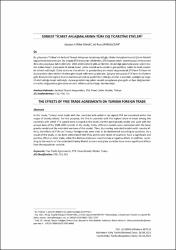| dc.contributor.author | Ayran Cihan, Kezban | |
| dc.contributor.author | Sandalcılar, Ali Rıza | |
| dc.date.accessioned | 2023-02-22T05:36:43Z | |
| dc.date.available | 2023-02-22T05:36:43Z | |
| dc.date.issued | 2021 | en_US |
| dc.identifier.citation | Ayran Cihan, K. & Sandalcılar, A.R. (2021). Serbest ticaret anlaşmalarının Türk dış ticaretine etkileri. Uluslararası İktisadi ve İdari İncelemeler Dergisi, 33, 37-52. https://doi.org/10.18092/ulikidince.987316 | en_US |
| dc.identifier.issn | 1307-9832 | |
| dc.identifier.issn | 1307-9859 | |
| dc.identifier.uri | https://doi.org/10.18092/ulikidince.987316 | |
| dc.identifier.uri | https://hdl.handle.net/11436/7660 | |
| dc.description.abstract | Bu çalışmada Türkiye’nin Serbest Ticaret Anlaşması imzalamış olduğu ülkeler ile toplam ticareti Çekim Modeli
kapsamında incelenmiştir. Bu amaçla STA imzalanan ülkelerden, STA kapsamındaki ticarette payı en fazla olan
ilk 6 ülke çalışmaya dahil edilmiştir. 1985-2019 dönemi yıllık verilerinin ele alındığı çalışmada panel çekim modeli kullanılmıştır. Çalışmada ilk olarak temel çekim modeli ve bu modelin genişletilmiş halleri ile farklı modeller tahmin edilmiştir. Daha sonra ise ülke etkileri ile genişletilmiş bir model oluşturularak STA’ların Türkiye’nin
dış ticaretine olan etkileri ülkelere göre tespit edilmeye çalışılmıştır. Çalışma sonucunda STA’ların ve ülkelerin
gelir düzeylerinin toplam ticaret üzerinde anlamlı ve pozitif etkili olduğu, ülkeler arasındaki uzaklığın ise negatif etkili olduğu tespit edilmiştir. Ayrıca genişletilmiş çekim modeli sonuçlarına göre gelir ve fiyat değişkenlerinin nüfus değişkenine göre daha anlamlı etkilere sahip olduğu belirlenmiştir. | en_US |
| dc.description.abstract | In this study, Turkey's total trade with the countries with which it has signed FTA are examined within the
scope of Gravity Model. For this purpose, the first 6 countries with the highest share in trade among the
countries with which FTA signed were included in the study and the panel gravity model was used with the
annual data of the 1985-2019 period. In the study, firstly, different models were estimated with the basic
gravity model and the extended versions of this model. Then, by creating extended models with country effects, the effects of FTAs on Turkey's foreign trade were tried to be determined according to countries. As a
result of the study, it has been determined that FTAs and income levels of countries have a significant and
positive effect on total trade, while the distance between countries has a negative effect. In addition, according to the results of the extended Gravity Model, income and price variables have more significant effects
than the population variable. | en_US |
| dc.language.iso | tur | en_US |
| dc.rights | info:eu-repo/semantics/openAccess | en_US |
| dc.subject | Serbest ticaret anlaşmaları | en_US |
| dc.subject | , STA | en_US |
| dc.subject | Panel çekim modeli | en_US |
| dc.subject | Türkiye | en_US |
| dc.subject | Free trade agreements | en_US |
| dc.subject | FTA | en_US |
| dc.subject | Panel gravity model | en_US |
| dc.subject | Turkey | en_US |
| dc.title | Serbest ticaret anlaşmalarının Türk dış ticaretine etkileri | en_US |
| dc.title.alternative | The effects of free trade agreements on Turkish foreign trade | en_US |
| dc.type | article | en_US |
| dc.contributor.department | RTEÜ, Fındıklı Uygulamalı Bilimler Yüksekokulu, Uluslararası Ticaret ve Lojistik Bölümü | en_US |
| dc.contributor.institutionauthor | Ayran Cihan, Kezban | |
| dc.contributor.institutionauthor | Sandalcılar, Ali Rıza | |
| dc.identifier.doi | 10.18092/ulikidince.987316 | en_US |
| dc.identifier.issue | 33 | en_US |
| dc.identifier.startpage | 37 | en_US |
| dc.identifier.endpage | 52 | en_US |
| dc.relation.journal | Uluslararası İktisadi ve İdari İncelemeler Dergisi | en_US |
| dc.relation.publicationcategory | Makale - Uluslararası Hakemli Dergi - Kurum Öğretim Elemanı | en_US |


















